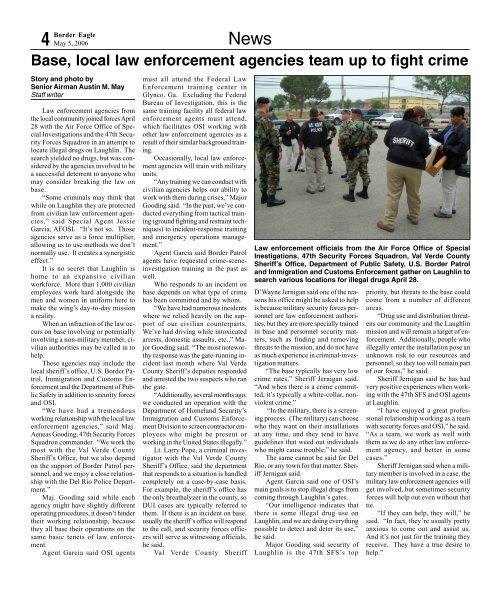Air Force mandates virtual outprocessing - Laughlin Air Force Base
Air Force mandates virtual outprocessing - Laughlin Air Force Base
Air Force mandates virtual outprocessing - Laughlin Air Force Base
You also want an ePaper? Increase the reach of your titles
YUMPU automatically turns print PDFs into web optimized ePapers that Google loves.
4<br />
Border<br />
Eagle<br />
May 5, 2006<br />
Law enforcement agencies from<br />
the local community joined forces April<br />
28 with the <strong>Air</strong> <strong>Force</strong> Office of Special<br />
Investigations and the 47th Security<br />
<strong>Force</strong>s Squadron in an attempt to<br />
locate illegal drugs on <strong>Laughlin</strong>. The<br />
search yielded no drugs, but was considered<br />
by the agencies involved to be<br />
a successful deterrent to anyone who<br />
may consider breaking the law on<br />
base.<br />
“Some criminals may think that<br />
while on <strong>Laughlin</strong> they are protected<br />
from civilian law enforcement agencies,”<br />
said Special Agent Jessie<br />
Garcia, AFOSI. “It’s not so. Those<br />
agencies serve as a force multiplier,<br />
allowing us to use methods we don’t<br />
normally use. It creates a synergistic<br />
effect.”<br />
It is no secret that <strong>Laughlin</strong> is<br />
home to an expansive civilian<br />
workforce. More than 1,000 civilian<br />
employees work hard alongside the<br />
men and women in uniform here to<br />
make the wing’s day-to-day mission<br />
a reality.<br />
When an infraction of the law occurs<br />
on base involving or potentially<br />
involving a non-military member, civilian<br />
authorities may be called in to<br />
help.<br />
These agencies may include the<br />
local sheriff’s office, U.S. Border Patrol,<br />
Immigration and Customs Enforcement<br />
and the Department of Public<br />
Safety in addition to security forces<br />
and OSI.<br />
“We have had a tremendous<br />
working relationship with the local law<br />
enforcement agencies,” said Maj.<br />
Aeneas Gooding, 47th Security <strong>Force</strong>s<br />
Squadron commander. “We work the<br />
most with the Val Verde County<br />
Sheriff’s Office, but we also depend<br />
on the support of Border Patrol personnel,<br />
and we enjoy a close relationship<br />
with the Del Rio Police Department.”<br />
Maj. Gooding said while each<br />
agency might have slightly different<br />
operating procedures, it doesn’t hinder<br />
their working relationship, because<br />
they all base their operations on the<br />
same basic tenets of law enforcement.<br />
Agent Garcia said OSI agents<br />
must all attend the Federal Law<br />
Enforcement training center in<br />
Glynco, Ga. Excluding the Federal<br />
Bureau of Investigation, this is the<br />
same training facility all federal law<br />
enforcement agents must attend,<br />
which facilitates OSI working with<br />
other law enforcement agencies as a<br />
result of their similar background training.<br />
Occasionally, local law enforcement<br />
agencies will train with military<br />
units.<br />
“Any training we can conduct with<br />
civilian agencies helps our ability to<br />
work with them during crises,” Major<br />
Gooding said. “In the past, we’ve conducted<br />
everything from tactical training<br />
(ground fighting and restraint techniques)<br />
to incident-response training<br />
and emergency operations management.”<br />
Agent Garcia said Border Patrol<br />
agents have requested crime-sceneinvestigation<br />
training in the past as<br />
well.<br />
Who responds to an incident on<br />
base depends on what type of crime<br />
has been committed and by whom.<br />
“We have had numerous incidents<br />
where we relied heavily on the support<br />
of our civilian counterparts.<br />
We’ve had driving while intoxicated<br />
arrests, domestic assaults, etc.,” Major<br />
Gooding said. “The most noteworthy<br />
response was the gate-running incident<br />
last month where Val Verde<br />
County Sheriff’s deputies responded<br />
and arrested the two suspects who ran<br />
the gate.<br />
“Additionally, several months ago,<br />
we conducted an operation with the<br />
Department of Homeland Security’s<br />
Immigration and Customs Enforcement<br />
Division to screen contractor employees<br />
who might be present or<br />
working in the United States illegally.”<br />
Lt. Larry Pope, a criminal investigator<br />
with the Val Verde County<br />
Sheriff’s Office, said the department<br />
that responds to a situation is handled<br />
completely on a case-by-case basis.<br />
For example, the sheriff’s office has<br />
the only breathalyzer in the county, so<br />
DUI cases are typically referred to<br />
them. If there is an incident on base,<br />
usually the sheriff’s office will respond<br />
to the call, and security forces officers<br />
will serve as witnessing officials,<br />
he said.<br />
Val Verde County Sheriff<br />
News<br />
<strong>Base</strong>, local law enforcement agencies team up to fight crime<br />
Story and photo by<br />
Senior <strong>Air</strong>man Austin M. May<br />
Staff writer<br />
Law enforcement officials from the <strong>Air</strong> <strong>Force</strong> Office of Special<br />
Inestigations, 47th Security <strong>Force</strong>s Squadron, Val Verde County<br />
Sheriff’s Office, Department of Public Safety, U.S. Border Patrol<br />
and Immigration and Customs Enforcement gather on <strong>Laughlin</strong> to<br />
search various locations for illegal drugs April 28.<br />
D’Wayne Jernigan said one of the reasons<br />
his office might be asked to help<br />
is because military security forces personnel<br />
are law enforcement authorities,<br />
but they are more specially trained<br />
in base and personnel security matters,<br />
such as finding and removing<br />
threats to the mission, and do not have<br />
as much experience in criminal-investigation<br />
matters.<br />
“The base typically has very low<br />
crime rates,” Sheriff Jernigan said.<br />
“And when there is a crime committed,<br />
it’s typically a white-collar, nonviolent<br />
crime.”<br />
“In the military, there is a screening<br />
process. (The military) can choose<br />
who they want on their installations<br />
at any time, and they tend to have<br />
guidelines that weed out individuals<br />
who might cause trouble,” he said.<br />
The same cannot be said for Del<br />
Rio, or any town for that matter, Sheriff<br />
Jernigan said.<br />
Agent Garcia said one of OSI’s<br />
main goals is to stop illegal drugs from<br />
coming through <strong>Laughlin</strong>’s gates.<br />
“Our intelligence indicates that<br />
there is some illegal drug use on<br />
<strong>Laughlin</strong>, and we are doing everything<br />
possible to detect and deter its use,”<br />
he said.<br />
Major Gooding said security of<br />
<strong>Laughlin</strong> is the 47th SFS’s top<br />
priority, but threats to the base could<br />
come from a number of different<br />
areas.<br />
“Drug use and distribution threatens<br />
our community and the <strong>Laughlin</strong><br />
mission and will remain a target of enforcement.<br />
Additionally, people who<br />
illegally enter the installation pose an<br />
unknown risk to our resources and<br />
personnel, so they too will remain part<br />
of our focus,” he said.<br />
Sheriff Jernigan said he has had<br />
very positive experiences when working<br />
with the 47th SFS and OSI agents<br />
at <strong>Laughlin</strong>.<br />
“I have enjoyed a great professional<br />
relationship working as a team<br />
with security forces and OSI,” he said.<br />
“As a team, we work as well with<br />
them as we do any other law enforcement<br />
agency, and better in some<br />
cases.”<br />
Sheriff Jernigan said when a military<br />
member is involved in a case, the<br />
military law enforcement agencies will<br />
get involved, but sometimes security<br />
forces will help out even without that<br />
tie.<br />
“If they can help, they will,” he<br />
said. “In fact, they’re usually pretty<br />
anxious to come out and assist us.<br />
And it’s not just for the training they<br />
receive. They have a true desire to<br />
help.”
















